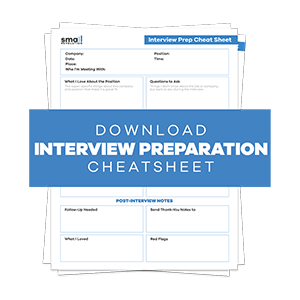When interviewers ask, “What are your weaknesses?” they’re not looking for a list of things you’re bad at. They want to know how you handle difficult situations and whether or not you can take feedback.
Therefore, it’s crucial to avoid some common interview mistakes when answering this question.
Another way to ace this question is by reviewing the best answers.
Once you know what is expected of you, rehearse your answers and ensure they cover:
- A trait you’ve been struggling to improve
- How that trait has been a challenge in the past
- The actions you’ve taken to improve
Why Hiring Managers Ask This Question
When you know the “why” behind this question, it’s much easier to give a great answer. The following are the reasons why hiring managers ask this question:
1: They Want to Know if You Can Improve
When you talk about your weaknesses, the interviewer wants to see if you can improve.
For example, if one of your weaknesses is you’re not the best at public speaking. The interviewer wants to know if you’ve taken any steps to work on the skill. Have you joined a Toastmasters club? Have you taken a class on public speaking?
If you have, what are the results? Are you improving? From these answers, the interviewer will know if you’re coachable and willing to put in the work to improve.
2: They Want to Know If You’re Self-Aware
You can’t be good at everything. Hiring managers ask this question to see if you know what you can do well and what you need help with.
Self-awareness is essential for many roles, especially ones that require managing people. Being self-aware ensures the smooth running of a team because you know what to delegate and when to ask for help.
3: They’re Testing Your Honesty and Trustworthiness
Something will go wrong at work at some point. Interviewers want to know if you’re a person who learns from mistakes or blames others for your mistakes. The hiring manager’s focus is to know if you can own your mistakes and work towards improving.

Good Answer 1: “I’m a Poor Public Speaker”
This answer demonstrates that you’re aware of a trait hindering your work productivity. When explaining your answer, illustrate how the weakness made it or still makes it hard for you to deliver to your best potential.
You can explain the weakness by talking about issues like:
- Anxiety when you hear about a meeting
- Inability to think on your feet
- Shaky voice while speaking
Based on these tips, a detailed sample answer to this weakness can be:
“I’ve been a poor public speaker in the past. I could not think on my feet and my voice became shaky whenever I was called to make a speech. I noticed that this was hindering my productivity.
I took a class on public speaking where my coach introduced me to different public speaking tactics like the use of humor and stories. I’ve noticed an improvement in my public speaking abilities since then. The shaky voice is disappearing, and I can now improvise and make up my mind fast.
Poor Answer: “I’m Shy”
This is an unsatisfactory answer because it lacks clarity. The question is not asking for your personality traits but rather your weaknesses. To make this answer better, describe the aspect of your work affected by being shy.
“I’m a poor public speaker” is a good answer as it demonstrates how shyness affects your productivity at work.
Good Answer 2: “I Have a Hard Time Saying No”

When you can’t say no, it means you’re a people pleaser. You might feel the need to lure others into liking or respecting you.
The problem with being a people pleaser is that it’s not sustainable in the long run because you’ll end up overworked and stressed out.
A good explanation of how this weakness has been a challenge in the past can be:
“In the past, I have had a hard time saying no, especially to my seniors. This led me to be overworked and stressed out. I would take on too many projects and not delegate because I wanted to make everyone happy.
I’ve learned from my past failures and I now try to maintain my work limits and delegate tasks. As a result, I’m less stressed and more productive.”
Poor Answer: “I Work Too Much”
Saying that you work too much sounds arrogant and cringe-worthy. It also demonstrates to hiring managers that you’re a person who stretches yourself thin, which eventually decreases your performance.
A better way to word this would be: “I have a hard time saying no.”
This demonstrates that although you might be a go-getter, you need to learn to delegate and take breaks.
Expert Tip: When answering this question, think about the position you’re applying for and its roles. Try to formulate answers that suit your specific roles if hired. This proves to hiring managers that you know what is expected of you if hired.
Good Answer 3: “I’m a Procrastinator”
According to Darius Foroux, 88% of employees procrastinate for at least one hour.
Stating that you have a weakness of procrastinating is not as bad as it seems because most employers can relate to it.
My advice is, never do tomorrow what you can do today. Procrastination is the thief of time. Collar him.
Charles Dickens
A sample detailed answer to this is:
“Procrastination has been my major setback in the previous roles. To solve this weakness, I embarked on research and asked people how they manage procrastination.
That’s how I came across the Pomodoro technique, which has helped me minimize procrastination at work. I’ve also learned that taking breaks in between work refreshes my mind. As a result, I’m now less likely to procrastinate.”
The table below shows the different subgroups of procrastinators.
| Type | Explanation | Percentage (%) |
| Mild procrastinators | People who experience minor procrastination issues | 24.93 |
| Average procrastinators | People who try as much as possible to avoid procrastination the moment it affects them | 27.89 |
| Severe procrastinators | People who are always late on deadlines | 21.69 |
| Primarily depressed procrastinators | They procrastinate because of depression | 11.55 |
| Well-adjusted procrastinators | They procrastinate regularly but are not negatively affected by it | 13.94 |
Poor Answer: “I Was Poor at Planning Ahead in School”
This is a poor answer as it portrays you as a lazy person. It also sounds like an excuse for not planning ahead.
A better way to word this would be: “I’m a procrastinator.” This is a more relatable answer as many employees struggle with procrastination. Moreover, procrastination does not mean you’re lazy as it can be caused by:
- Poor organization skills
- Lack of motivation
- Trouble concentrating
- Lack of understanding
The video below illustrates how to do the pomodoro technique discussed in the answer above:
Learn the Skills You Need to Ace Interviews
Creative Live is an excellent platform to learn new skills needed to prosper in life. It’s a platform with over 2,000 courses to equip people with the skills they need to pursue their dream career, life, and hobbies.
The courses here are taught by the world’s top experts. ‘The art of the interview’ is one of Creative Live’s courses intended to equip people with relevant interview skills. Taking this paid course will put you on the right track to getting hired during your next interview.
Frequently Asked Questions
Why do hiring managers ask “what are your weaknesses?”
Hiring managers ask “what are your weaknesses?” question to test your self-awareness. They want to see if you can identify your weaknesses and are willing to work on them.
What are individual weaknesses?
Individual weaknesses are also referred to as personal weaknesses. They refer to your unique challenges or areas that need improvement. Examples of individual weaknesses include:
- Procrastination
- Inflexibility
- Perfectionism
- Lack of self-confidence
How do I know my weakness in myself?
You will know your weakness by reflecting on your past experiences. Think about the times when you struggled or felt challenged at work.
Alternatively, ask your friends and family for their honest opinions. Once you have identified your weaknesses, start working to improve them.
Share on Facebook:



